“90 Days Later” – A PS to the interview with Markus Heidingsfelder on the Lab Leak Thesis
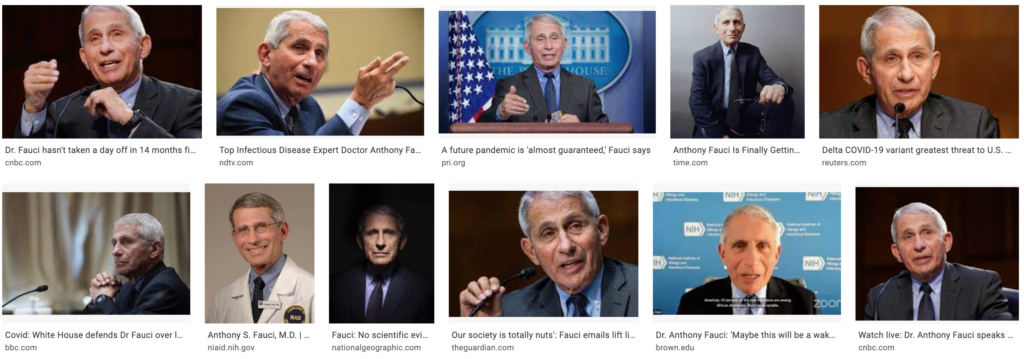
Google image search on ‘Fauci’, 28th June 2021
AK: Hi, Markus.
Hello, Arqam, hello, Aymen.
AK: Here we are again, more than 90 days later.
Yes, here we are. I am happy to see that you are both still alive and well.
AK: Alive, yes. Well, not so much.
AA: Yeah, these lockdowns are killing us. You’re old, you don’t care.
Thanks for the reminder (laughs). But it’s true, I’m old, and I don’t find these lockdowns that hard. Time to read, to write … But I’m well aware that it’s tough for young people. Or for families!
AK: Glad you are enjoying your solitary confinement! Just great. But where are we now concerning the origin of the virus? What has Biden’s ’90 days task force’ found out?
Well, nothing of course. I kind of understand the scorn with which the USA was being currently showered by the Global Times for instance – they brought this on themselves. Far from being an intelligence community, they have proven to be the opposite – a “simple-minded” one. They are simple-minded if they really thought they could answer that question within 90 days. And they are simple-minded if they think they can answer it.
AK: Facts, please.
There are no new facts! And that result was foreseeable. The Americans are still divided over two theories, one suggesting it jumped naturally from animals to humans and the other, politically motivated one that says it has originated from the lab in Wuhan. We talked about this extensively last time: Scientists agree that the first case is plausible, and the second case not so much. Biden’s team didn’t find any solid evidence that supports the lab leak theory. That was the case 90 days ago, that is the case today. I couldn’t help but laugh when reading this text on CNN: “The intelligence community’s inability to present one theory with high confidence after three months of intense work underscores just how difficult it us to probe the origins of the Covid-19 pandemic.” Really? You don’t say! As if one couldn’t have known that three months ago.
AA: But these poor people can’t help it if their boss Biden gives them this impossible assignment.
That’s a great title by the way, Aymen: “Mission Impossible Part …” – how many parts are there?
AA: Six so far. But they’re working on two more.
“Mission Impossible Part 7: Wuhan Protocol”. Or something like that.
AA: “Rogue Nation Part 2” fits even better.
Mean, Aymen. Very mean. But yes, indeed, that is what some American politicians try to prove – that this ‘rogue nation’ did it. And that’s the message the Global Times and others got: that the US desperately wants to frame China. It’s understandable that they see it that way, because Biden’s boys did their best to ‘pimp up’ thesis no. 2, although almost every renowned scientist – while not ruling out this possibility – considers it extremely unlikely. As the Global Times writes: “The US teams still made do with second-hand, unreliable evidence to compile a report that tries to smear China as culprit for the virus origins … ” Again: So far there is no evidence that a rogue nation was involved. Or that it escaped from a lab.
AK: You said the lab leak thesis is politically motivated. Why?
Because it wasn’t so much scientists, but the Republicans who tried to elevate it to the rank of an equivalent explanation. They obviously succeeded more or less – this stupid 90 Days Report proves it, it would not have come into being without their anti-scientific conspiracy lobbyism. Fox News for instance reported that a number of Republicans had found out that the Wuhan National Biosafety Lab requested bids for major renovations to air safety and waste treatment systems. Such a significant renovation so soon after the facility began operation! If that’s not suspicious!
AA: Well, on the one hand it may be silly to read something into this. But the question of how well these systems were functioning in the months prior to the outbreak of COVID-19 is legitimate, isn’t it?
Ok, but not much can be deduced from such a renovation. If you cleaned your apartment the other day, really thoroughly, that doesn’t mean that you committed a murder there before and just wanted to cover the tracks. That is exactly what the German sociologist Armin Nassehi is concerned with in an article that came out today: If everything is always investigated because something evil is assumed here, normality cannot return. Then the crisis – the pandemic – continues.
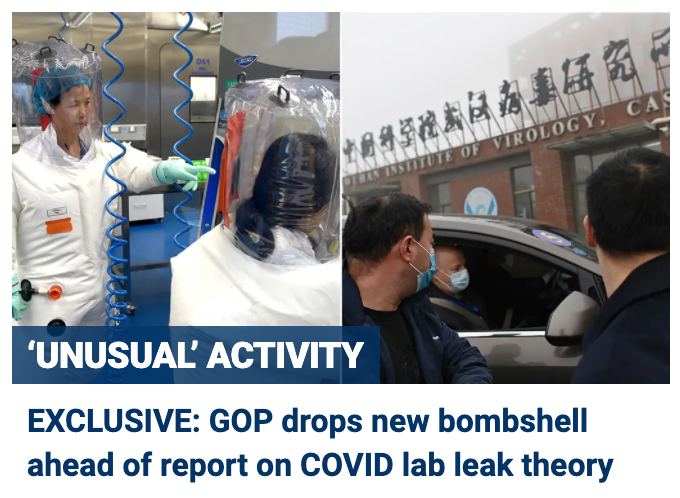
Fox News reporting on ‘unusual’ activity in the Wuhan Lab, 3 August 2021
I always enjoyed reading the Fox commentaries – that promised interesting insights into the Republican soul, even and especially if some were written by Trump’s 50 Cent army. Unfortunately, that ‘Conversation’ function was recently taken down, maybe it was too toxic, even for Fox …
AK: Yeah, but it’s back up again.
AA: I guess the readers weren’t too happy about it. Where else can you make racist remarks in a national newspaper if not Fox?
True, it gives such remarks a certain value …. Anyway, I had written down some of those who commented on that Fox ‘bombshell’ report. A guy named Andie Taylor wrote: “Common sense; the country of origin is China and they won’t cooperate with an investigation? They affected the entire world and if they won’t cooperate in investigations and preventions it had to have been planned. They were the fastest with a vaccine which means they knew of an issue long before the world, OR it was planned from the get go in an effort to obtain world dominance.” That seems to adequately represent the position of the GOP. And someone named WVJeffusa adds: “Amazing none of the chinese leadership got sick…just sayin…” Very suspicious indeed, isn’t it? Probably they are just smarter than Trump, wear mask, avoid superspreader events.
AK: To sum up, there are still two hypotheses were the virus could come from. One is favored by the majority of scientists, that’s the spillover one, and the other one, which is only held by a handful of scientists, but many politicians and journalists find this one more interesting, that’s the lab leak hypothesis. And that’s it basically. Correct?
Yes. I still think that it’s a lot of noise about nothing, hyped up by politics and the mass media. Nassehi asks in his article when the pandemic will end. Answer: When routines can take hold again and this constant arguing about the measures stops, be it about mask regulations or about vaccination or …
AA: Lab leaks.
Right. Unfortunately, it is the mass media, even the so-called liberal ones, that prevent this – that scandalize and exaggerate and … I don’t even watch the German news anymore, because they only report about Covid, Covid, Covid. Yet there are far more important issues. And in the USA, the ununited SA, this return to normality does not seem to be possible at all. The country seems to be falling apart right now, into these two halves. I suggested in my Trump book to think of it as a failed state, the Global Times picked up on that the other day. Yes, it looks as if the US is failing, at least when we measure it by its own standards.
AA: You could have mentioned that many people didn’t want to consider the lab leak thesis because it was politically poisoned by Trump.
Well, that may be true for some journalists. Or some ‘liberal’ newspapers. But again, science isn’t politics. It isn’t the mass media. Think of Galileo doing his acceleration experiment today. Let’s say the Church is the Republican party, and Galileo is a Republican, and the position of the Democrats is: ‘All objects fall at practically the same rate.’ Equality, you know, Democrats love that. And the Republicans are in favor of the Aristotelian position …
AK: Which is that the speed of fall is proportional to the weight, and that there is also some acceleration.
Right, thank you, Arqam. Now Galileo makes the test – let’s say he performs it from Trump Tower, because Trump is his friend – and it turns out: No, unfortunately the Republican position is wrong. Even if he really, really wants the Republican position to be right, and he would love to give his buddy Trump some other result, he cannot ignore the outcome of the test. Because that’s what matters to him as a scientist: what is true? What isn’t? So if it may turn out that it was a leak, if we can gather enough data to back it up, no scientist on earth, no matter how ‘liberal’ she may be, will dismiss it.
AK: But if Trump were to be proved right in the end … that would have an impact.
Yes, but he didn’t argue this thesis because he thought it was scientifically plausible. It simply suited him perfectly. Then he would have been lucky, true. It wouldn’t change my image of Trump though. Yours?
AK: No.
AA: But the letter that was published in The Lancet, that was a mistake, right?
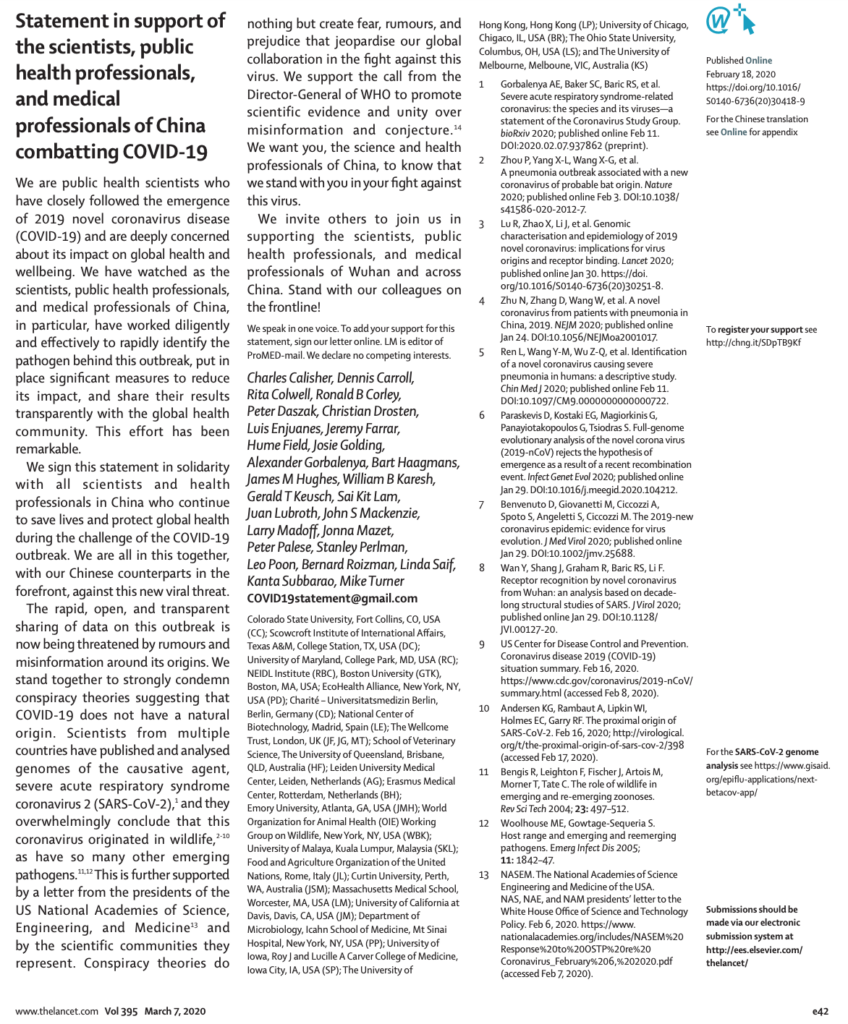
Letter published in The Lancet rejecting the lab leak thesis
Kind of. I wouldn’t say that the authors betrayed the values of science … although it did remind me a little bit of the 1970s, when scientists had to show loyalty to the progressive movement, something that Steven Pinker describes very nicely in his book The Blank Slate. Only that they showed loyalty to their Chinese colleagues. On the other hand, what is there to say against an initiative that tries to ward off racism – or against scientists demonstrating their solidarity with their Chinese colleagues? It may not have been science, but I don’t think it was an attempt to cover-up anything – even if Mr Daszak who initiated it may have a conflict of interests here.
AK: … because his organization funded coronavirus research at the Wuhan Institute.
Yes. But that is not true for most of the scientists who signed it. Of course, they used their authority somewhat excessively, that wasn’t clever. After all, it worked for a short time. But communication doesn’t stand still, it creates mutants, just like the virus.
AK: Have you noticed anything else with relation to the ‘pandemic discourse’ since we last spoke?
Yes, quite a few things. First of all, just a few days after our interview, Fauci reacted to the accusations in an interview with the New York Times. He said, “Here’s a guy whose entire life has been devoted to saving lives, and now you’re telling me he’s like Hitler?” And what people paid attention to was not what he said, but how he said – the fact that he talked about himself in the third person here. They found that creepy.
AA: Isn’t it?
I could quote him: “Come on!” Not really. It’s a technique to look at yourself from the outside, maybe he did it to create some distance to what goes on. Who knows. I guess he himself doesn’t. But to think that this is suspicious, this tendency to always suspect a ‘behind’ – exactly what, according to Nassehi, prevents the return to normality – that is actually a very popular game in modern society. It is called ‘latency’. You look for what people say without actually saying it, what they are trying to hide, but what nevertheless shows. German magazine Der Spiegel did the same thing in their title story some weeks ago. They said – listen to this, this is a quote, I love it: “So far, it is not so much science that speaks in favour of the laboratory hypothesis, but above all the suspicious behavior of some politicians and researchers.” By ‘suspicious’ they don’t mean any renovation. Or that – allegedly – no Chinese leader was infected with the virus. No, they mean the fact that they did not get an interview with the head of the Wuhan Institute, Shi Zhengli. So what do these super reporters do? They fly to China, go to her unannounced – and wonder why they still don’t get one. How suspicious!

DER SPIEGEL cover, 27/2021. The German text reads: “Did the virus come from the bat – or from the laboratory? The return of an evil suspicion.”
That’s how this Spiegel cover story starts: This ‘bat woman’ is not talking to us, she must be hiding something. It’s their Claas Relotius tradition. So much for their famous motto. Just look at their cover, it’s like from a horror movie, the institute against a gloomy sky, buzzing with bats – no, that is not “sagen, was ist” at all. There are no bats swirling around that building. Why did they fire Relotius for his beautiful stories, and the people responsible for this horror cover are still employed? And by calling it “The Enigma of Wuhan”, they suggest the origin has something to do with that place, with that institute. We still don’t know that, it was first sighted there, ok, but nothing more. It’s really time they removed these letters that are attached to the wall of their lobby.
AA: Which letters?
“Sagen, was ist.” Tell it like it is, with Aaron Neville. A great song. But a stupid motto. As if assertions of existence say themselves and are not put into the world by people who claim that something is. That’s the real enigma, ‘The Enigma of Hamburg’.
AK: Which is where they have their headquarter.
That’s correct. They claim that they follow this motto, that they have a privileged access to what is considered factual. They already couldn’t resist to do this “Made in China” headline, long before Trump said anything like that. Maybe he got it from them.
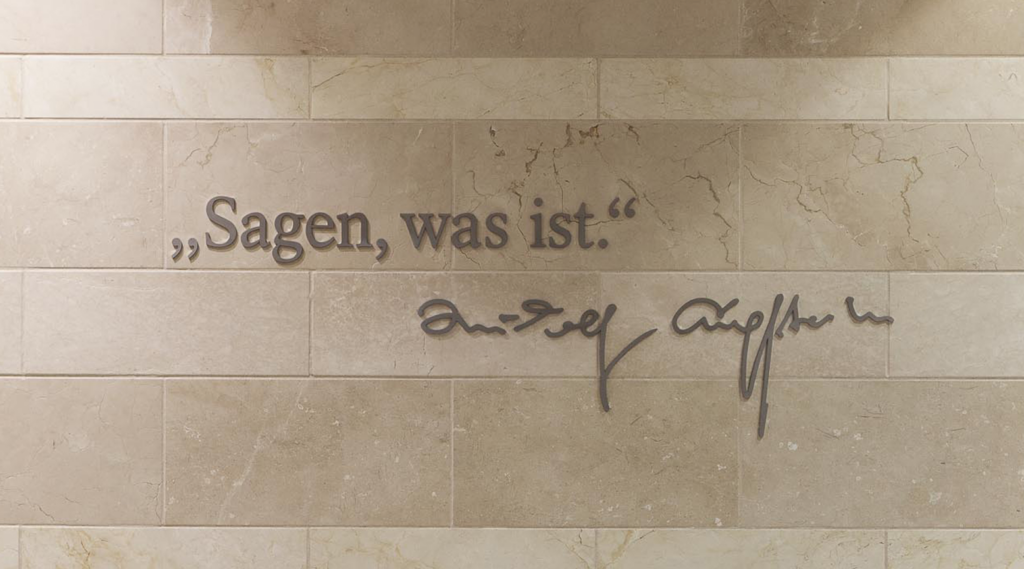
The motto of Der Spiegel on the wall of the paper’s headquarter in Hamburg (Photo: Markus Heidingsfelder)
But there are also examples of good journalism – I was recently listening to the excellent Podcast series by the South China Morning Post. They did one on the 11th June on the lab leak thesis, in which they also mention Dean Koontz’s novel from 1981, “The Eyes if Darkness”, a story about a Chinese scientist who brings a biological weapon called “Wuhan-400” to the United States that was developed outside of the city of Wuhan …
AK: Wow.
Great coincidence, isn’t it? But we are lucky. In his book, Wuhan-400 has a mortality rate of one hundred percent. Anyway, one of their reporters, Simone MccCarthy, made a wonderful statement that stuck in my mind: “People love conspiracy theories … People have such a hard time wrapping their head around the idea that actually mother nature is perfectly devious all by herself.” From McCarthy’s view, what we observed in the last weeks, the return of the lab leak thesis, is a “turn of public opinion in the US”. I am not sure about this, unless we consider what these media organizations say as the ‘public opinion’. Empirically, this is a tricky one. But the thesis has definitely become socially acceptable when even a guy like Jon Stewart advocates it.

Asian palm civet over a tree. Praveenp, CC BY-SA 3.0 <https://creativecommons.org/licenses/by-sa/3.0>, via Wikimedia Commons
McCarthy also talks about the report that was recently published in Nature that took a closer look at the role of fur markets in China, over months. And the authors note: nearly 50,000 animals have been sold in these markets within the last two years, and many of these animals are known to be intermediary hosts. So instead of cultivating these conspiracies, we should trace back these supply chains. Quite interesting by the way, the paper says there are no bats involved, quote: “no pangolins (or bats) were traded, supporting reformed opinion that pangolins were not likely the spillover host at the source of the current coronavirus (COVID-19) pandemic”. So Der Spiegel needs to change its cover. They need to have palm civets and minks jumping around, and certainly not around the Wuhan Institute – which would make for a much nicer, less dramatic cover of course.
AA: I love civets. They are so cute!
Exactly. They’re cute. Bats – not so much. Allow me one more remark on Fauci.
AK: Please.
You remember that I quoted Oppenheimer, who said he had blood on his hands? That’s what they accused Fauci of, too. But he obviously didn’t know the reference, because he said he’s no Hitler. Well, that is not what they said. I think they accused him of being ‘an Oppenheimer’, not a Hitler.
AK: He said that the people attacking him are “actually criticising science”.
That was exactly my point. That what he said was ‘science as usual’. And that was criticized. So I agree with him here, when he reacts to these accusations, ‘Ah, Fauci misled us. First he said no masks, then he said masks’. His answer is kind of cool: ” Well, let me give you a flash. That’s the way science works. You work with the data you have at the time.” Of course you do. The scandal is that you have to say it. But it won’t change any narrow minds, it doesn’t matter what he says. Arguments are lost on people which ‘believe’. No flash will enlighten them.
AA: Since our interview, more and more liberals are now in favor of the lab leak idea. You mentioned Jon Stewart.
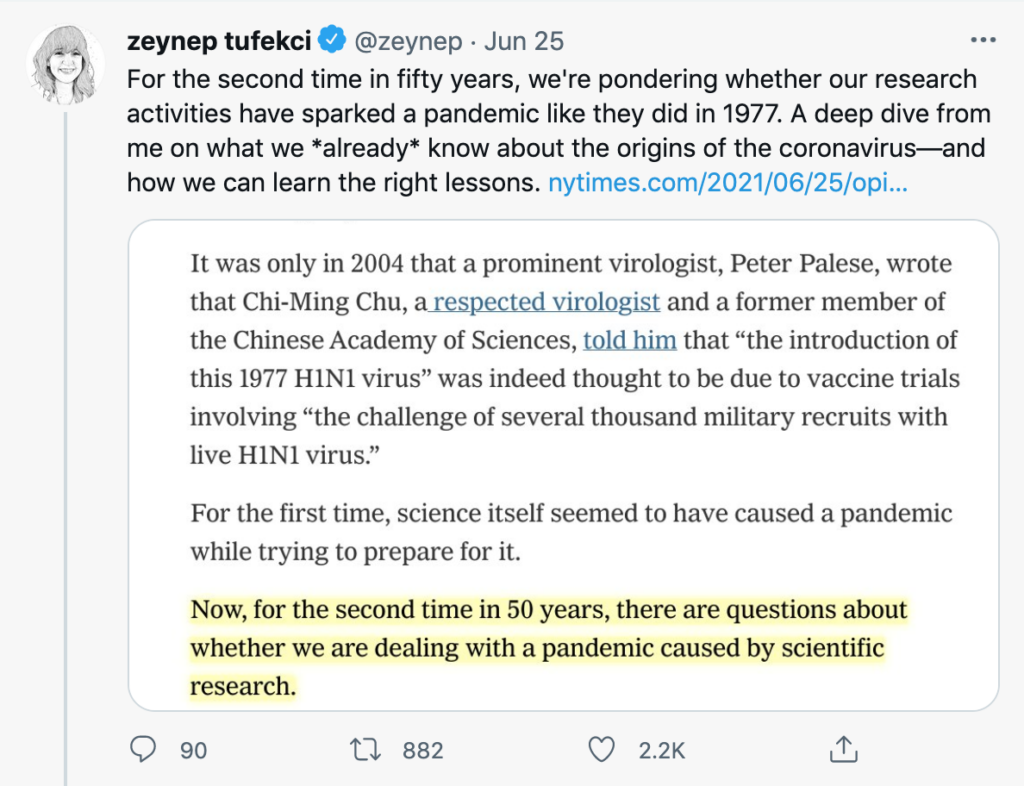
Tufekci tweet on her NYT opinion piece
Yes, Stewart comes to mind, or someone like Zeynep Tufekci. So that is certainly an interesting trend. However, neither Stewart nor Tufekci are virologists or epidemiologists. They are no experts. The one is a – kind of retired – comedian, the other one a kind of sociologist, a sociological publicist. A good one, no doubt. She reads, she does her homework. But again, she is no virologist. Experts like Christian Drosten still say that the lab leak thesis is very unlikely. At least when it comes to the idea that it accidentally escaped. Drosten decidedly doesn’t comment on what is probably the most exciting, most spectacular thesis for the Western media – that it was a malicious action by the Chinese government. He says, that is up for the ‘intelligence community’ to decide. Our “90 days boys”.
AK: And what does Tufekci say?
She basically says, we – the scientists – may have blood on our hands. May. Echoing the things that were written in this Vanity Fair article – which is kind of funny by the way, because the author of that op ed complained: “She didn’t refer to my text! She got it all from me!” Let’s not forget , this is a market – people vying for public attention. “I said it first!” Quite funny, actually.
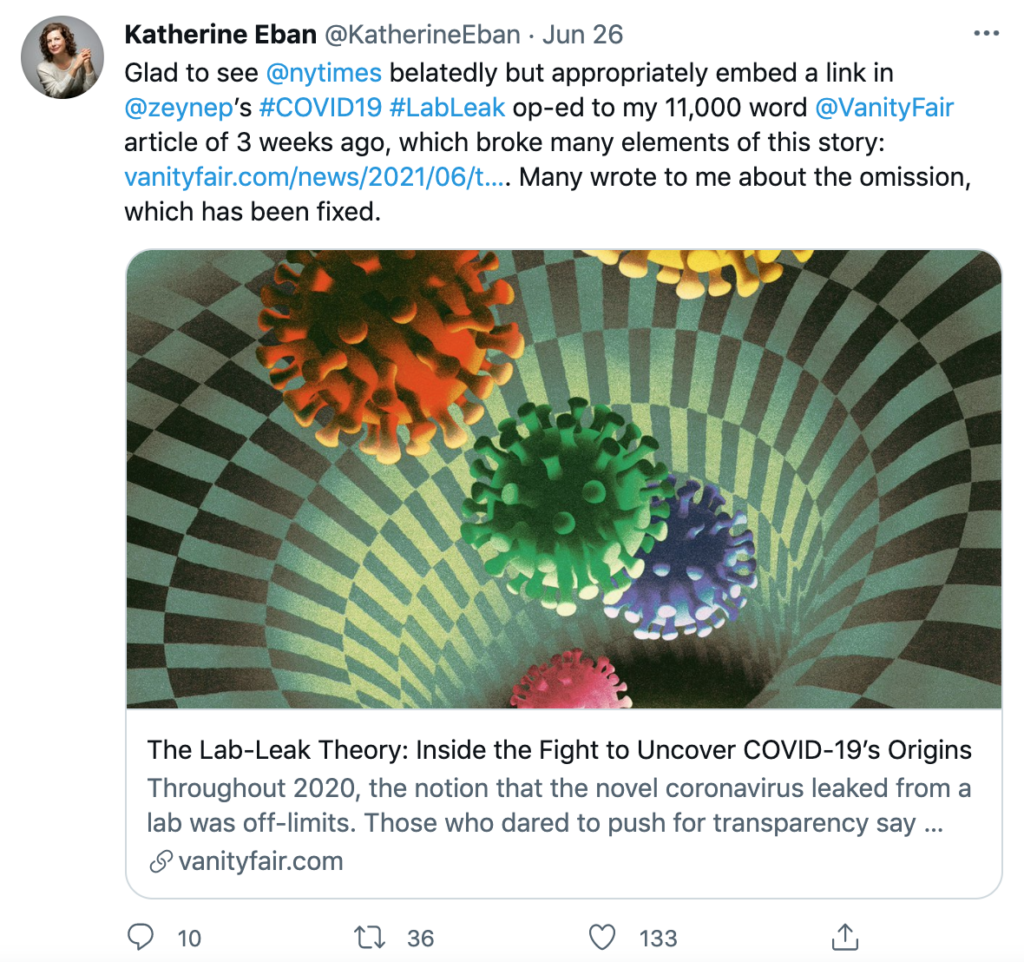
Katherine Eban setting the record straight: I broke it first
Anyway, Tufekci’s main message is: ‘Maybe it came from a lab, maybe it didn’t.’ Which is of course correct.
AK: What is Christian Drosten’s take?
He says the same thing every respected scientist says and has been saying from the start: that the lab origin is a possibility. But the suspicion that someone might have deliberately modified the virus is far-fetched, he says. Because, and I quote him: “If someone had developed Sars-2 in this way, I’d say they’d have done it in a pretty roundabout way. They didn’t have to make it so difficult.”
To illustrate that, he put himself in the shoes of the bad people, the bad scientists who want to make the virus more contagious. Just like a profiler who puts himself in the killer’s shoes. What would be changed? Where would they start? The evil scientist would start at the so-called furin cleavage site, because this site makes it easier for the virus to enter the human cell. So the bad guys in science are now giving a coronavirus this furin cleavage site, which is known from influenza viruses, to see whether it makes it more malicious. And how would they do that? Drosten says he would use the Sars-1 virus in a form that can be modified in the laboratory. To build such a DNA clone from a virus alone means several years of work, but it has been done, researchers have actually made such clones from the original Sars-1 virus. So if you wanted to develop a kind of Sars-2 in the laboratory, he says, you would have inserted changes, for example this furin site, into such a Sars-1 clone. In order to find out: Does this adaptation make the Sars virus more infectious? But, says Drosten, that was not the case here. Sars-2 is full of deviations from the original Sars-1 virus.
AA: I don’t get it.
He explains it with an image. To check whether adjustments make the virus more contagious, the evil scientist would take an existing system, put the change in there and then compare that with the old system. Just like someone who wants to know whether a new car radio improves the sound would take an existing car. He doesn’t build a completely new car for that. But that’s exactly what happened with Sars-2, says Drosten: “The whole car is different.”
AA: But Drosten isn’t an evil scientist. He is obviously a good person. Maybe an evil scientist thinks differently. Crazy ones would change the car. I heard of people that changed their car because the ashtray was full.
AK: What is the most plausible origin for him?
We talked about that last time already, and the paper in Nature also seems to confirm that. He thinks it’s the fur industry. Simply because of the clearly documented origin of Sars-1, which is a virus of the same species. The transitional hosts here were tanuki and creeping cats. And tanuki are used on a large scale in the fur industry in China.
AA: The civets are innocent. I knew it.
What in God’s name have the tanuki done to you?
AK: Anything else you want to share?
Remember what I said 90 days ago when we talked about the letter that Drosten et al. published in The Lancet? That virologists know a lot about viruses, but not so much about the dynamics of communication. And when they asked him about his experiences as a media expert, he mentioned exactly that – that the way the mass media work caught him by surprise.
AK: In how far? That they attacked him?

Markus Heidingsfelder is Associate Professor of Media Theory at BNU-HKBU United International College, China. He studied television, film and theatre studies at the University of Cologne and received his doctorate from Ludwig-Maximilians-Universität Munich in 2009. He held teaching positions at DJS Munich, LMU Munich, HCU Hamburg, FU Berlin, Habib University, and Xiamen University Malaysia. Recent publications: Trump beobachtet (Observing Trump, Springer 2020); Corona – Weltgesellschaft im Ausnahmezustand? (World Society in a State of Emergency? Velbrück 2020); George Spencer-Browns ‘Design with the NOR’ (Emerald 2021).
No, he was surprised by their mechanisms. You know they love conflict. So if a hundred scientists agree on something, like the origin of the virus, that is just boring to them. But here come the two or three that disagree, that hold the opposite thesis – and Drosten couldn’t believe how much the media played up these few people, devoted themselves to them so extensively, gave them so much space. So that it appeared as if it is a real opposition.
It could be that people like Stewart or Tufekci succumb to a certain extent to this temptation of being one of those few that disagree – they realise what kind of attention they are getting all of a sudden. Not only that, you are then also celebrated as particularly brave and courageous for opposing the mainstream – except that the ‘mainstream’ here is the scientific consensus! So this is a real misunderstanding. I know, I’m not a virologist myself, I said it quite a few times, I should actually be very quiet – but maybe sociologists should really shut up when it comes to questions like the origin of viruses. And comedians anyway! They are welcome to joke about it. But what, I would ask Jon Stewart, is funny about: “Well, it must be, scientists created it!” Ha ha ha.
AA: He didn’t say that. He said when scientists who worked at the lab are asked about the virus’ origin, they respond with “maybe a bat flew into the cloaca of a turkey and then it sneezed into my chili.”
Not so funny either, is it?
AA: And he said scientists don’t know when to quit.
Looks like he is talking about himself here.
AK: Always criticizing others! Have you ever thought about whether there is something wrong with your model?
With my description, you mean?
AK: Yes. Society still being a functionally differentiated one. Many people think this is not adequate any longer.
That’s indeed something that is being discussed these days. As you know, my position on this is: Yes, things are changing, yes, we’re on our way to the next society – but we are not there yet. We’re in a phase of transition, but the old structures still hold. That’s how I use the term ‘postmodernity’ – no longer modern, but not yet something else.
A friend of mine, Hans-Georg Moeller, who published this beautiful text on Vincente Garau here on mediastudies.asia, made this interesting comment lately. He said maybe we should imagine the mass media as a mafioso, a mob boss, who makes science an offer it cannot refuse. And for a moment, just for a moment, I thought: ‘Maybe there is some truth to that.’ But people like Drosten, I don’t think they are intimidated by it. Irritated, yes. Massively irritated, yes. But they can’t be blackmailed. Provided they do justice to their roles! It may well be, here I agree, that there are difficulties in the area of the role – and here again Trump is a good example, who has disappointed all the role expectations of him. He simply refused to play the president, to do justice to this role. But if you look at politics or science itself, that is, if you don’t look at the people, then no intimidation is of any help anyway – you can’t put a gun to the head of science, because it doesn’t have one. It consists of structures, it’s not a person, and the orientation is still: to find out the truth about an issue, and to do so in a methodically secure way, with recourse to data.
AA: Didn’t the Vatican do that to your beloved Galileo? Put a gun to his head? Ok, there were no guns yet, but …
AK: Yes, there were!
True, they already had guns. And they did in fact use a threat to get him to retract his statement from the moving earth. But they did it in a very subtle way. If the legend is to be believed, they gave him this nice tour of their torture chambers. So they just showed him the gun, if you like. And while they looked at all these torture devices they asked him to maybe rethink whether the earth is moving. Which he did, he renounced his doctrine of the earth movement.
AA: Coward.
You think so? I think it was the right thing to do. You don’t have to be killed for the truth. Not even tortured.
AA: You have to stand up for the truth! Even when it hurts.
No, I disagree. I know there is this Western tradition – I guess it has a lot to do with christianity. Jesus, or John the Baptists, who told the king that his adulterous lifestyle is sinful. They throw him in jail, he still doesn’t back down, eventually they have him executed. In fact he really lost his head. Galileo didn’t. Shows the difference between religion and science. As the saying goes, the truth will assert itself in the end. You don’t need martyrs for that. Just let communication do its job.
AK: That sounds like Daoism. Wu wei – don’t do anything. Don’t interfere.
That’s interesting. I did not have that in mind, but maybe you are right. But you would have to ask Hans-Georg Moeller about this. I guess that again shows how close systems theory and Asian philosophy are. From the systems perspective, any attempt to interfere is nothing but an ‘irritation’ anyway. And for Luhmann, the biggest system, the system encompassing all other systems, is society. It knows best how to deal with all these exciting developments. It may have no head, but it’s amazingly clever.
AK: Thank you for the interview, Markus. We hereby officially close the case. If new information arises, we will get back to you.
Interview & Transcript: Arqam Khan and Aymen Ansari